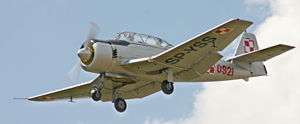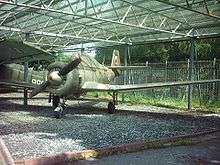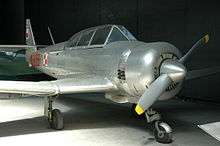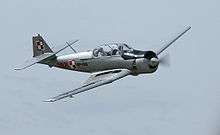PZL TS-8 Bies
| TS-8 Bies | |
|---|---|
 | |
| TS-8 during Góraszka Air Show 2007 | |
| Role | Trainer aircraft |
| Manufacturer | WSK PZL-Mielec |
| First flight | 23 July 1955 |
| Introduction | 1957 |
| Retired | 1978 |
| Primary users | Polish Air Force Aeroklub Polski |
| Produced | 1957–1960 |
| Number built | 251 |
|
| |
The PZL TS-8 Bies is a Polish trainer aircraft, used from 1957 to the 1970s by the Polish Air Force and civilian aviation.
Development
The aircraft was designed in response to a Polish Air Force requirement for a modern piston-engined trainer with a retractable tricycle landing gear to replace Junak 3 and Yak-11 aircraft. The main designer was Tadeusz Sołtyk – hence the designation letters TS. The plane was named Bies - a folk name for the devil. Work started in 1953 and the first prototype was flown on July 23, 1955. In 1956 and 1957 it beat three international records in its class.[1] The second prototype was shown at the Paris Air Show in 1957.
In 1957 the first experimental series of 10 aircraft was produced by WSK-Okecie (designated as TS-8 BI). A slightly improved main variant, designated as theTS-8 BII, was produced from 1958 to 1960 by WSK Mielec. The last 10 machines,TS-8 BIII, were built with better avionics, in total 251 TS-8 were produced of which 229 were the TS-8 BII variant.
The TS-8 had good handling and performance; a noisy engine being one of its few flaws. It was the first really modern aircraft designed in Poland after the war, that also used a Polish engine.
Design
The TS-8 was an all-metal low-wing cantilever monoplane, with metal-covered semi-monocoque fuselage, oval in cross-section. The three-part single-spar wing, of semi-monocoque design, creating a transverse inverted gull wing "W" shape. It had a Tricycle retractable landing gear, and a 7-cylinder WN-3 radial engine in front, delivering 330 hp take-off power and 283 hp normal power to a 2.2 m diameter two-blade variable pitch wooden propeller.
The crew of two, sat in a tandem enclosed cockpit, with twin controls, the student in front with the instructor in the rear. Canopy sections above the crewmen slid rearwards.
The plane had no armament, except for the experimental series TS-8 BI, which had one 12.7mm machine gun and two small bomb pylons.
Operational history
The TS-8s began to be withdrawn from Polish Air Force service in the mid-1960s, being replaced by PZL TS-11 Iskra jet trainers. Over 100 withdrawn aircraft were handed over to the civilian aviation (aero clubs). Most TS-8s were finally withdrawn from civilian aviation by 1978, with three currently remaining airworthy. Two TS-8s were used by Indonesia.
Variants


- TS-8
- 3 prototypes.
- TS-8 BI
- First experimental series, 10 built.
- TS-8 BII
- Improved TS-8 BI. Main production version, 229 built.
- TS-8 BIII
- Version equipped with better avionics, 10 built.
Operators

- Indonesian Air Force received two aircraft which were based in Bandung.
Specifications
Data from Jane's All The World's Aircraft 1961–62[2]
General characteristics
- Crew: Two (student & instructor)
- Length: 8.5 m (28 ft 5½ in)
- Wingspan: 10.5 m (34 ft 5 in)
- Height: 3.0 m (9 ft 10 in)
- Wing area: 19.10 m² (205.6 ft²)
- Aspect ratio: 7.38:1
- Empty weight: 1,070 kg (2,359 lb)
- Loaded weight: 1,550 kg (3,417 lb)
- Max. takeoff weight: 1,600 kg (3,525 lb)
- Powerplant: 1 × Narkiewicz WN-3 7-cylinder radial engine, 239 kW (320 hp)
Performance
- Maximum speed: 312 km/h (169 knots, 194 mph)
- Cruise speed: 270 km/h (146 knots, 168 mph)
- Range: 800 km (432 nmi, 497 miles)
- Service ceiling: 6,000 m (19,685 ft)
- Rate of climb: 6.8 m/s (1,340 ft/min)
See also
- Aircraft of comparable role, configuration and era
References
- ↑ World records of height 7084.5 m in C-Ic class (weight 1000–1750 kg), distance in a closed circuit 2884.5 km in C-Id class (weight 1750-3000 kg), speed 317 km/h in a closed circuit 2000 km in C-Ic class
- ↑ Taylor, John W. R. Jane's All The World's Aircraft 1961–62. London: Sampson Low, Marston & Company, 1961. pp. 121–122.
External links
![]() Media related to PZL TS-8 at Wikimedia Commons
Media related to PZL TS-8 at Wikimedia Commons